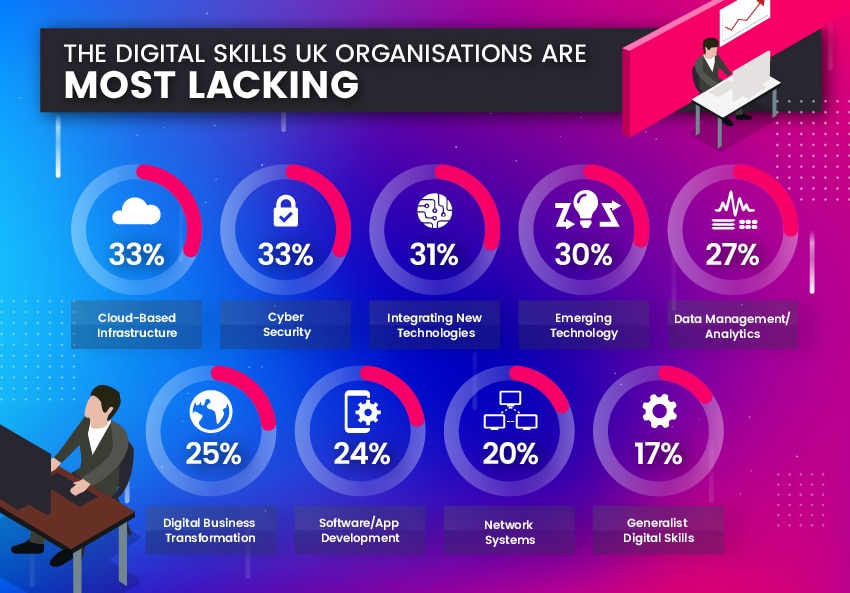Digital Skills Gap predicted to cost UK £141 billion in GDP growth
4/09/2019 - The Knowledge Academy

Technology is invaluable in today’s workplace with organisations using the different capabilities available to streamline and improve various aspects of their operations and processes. But given the rapid development of existing as well as new technologies, are workers gaining the necessary education and awareness of these technological innovations at the same rate?
Statistics from innovative researcher Accenture would suggest not and worryingly show that employees are lacking the knowledge needed to meet the demands of a digitally driven organisation. They report that this apparent digital skills gaps could cost the UK an astonishing £141 billion in GDP growth over the next ten years.
Interested in the modern workplace, training and qualification provider TheKnowledgeAcademy.com analysed the latest findings from The Open University, who surveyed 500 senior business figures (chief technology officers, HR directors, HR managers) from across the UK to identify the digital skills they think their organisation is most ‘lacking’ presently.
The Knowledge Academy found that the ability to successfully develop and manage a move to cloud-based infrastructure (33%), is one of the two digital skills that senior business figures believe their organisation most lacks.
The other digital skill highlighted by the prominent individuals is inadequate cyber security (33%) competencies. Given how a severe cyber-attack can cripple multiple business functions and compromise sensitive data within a matter of moments – it’s an issue now very high on the agenda for key decision makers in most organisations.
The Knowledge Academy analysis also discovered:
- 31% feel their firm struggles to integrate new technologies and/or data sources to existing business practices because they don’t have the sufficient ‘know-how’ to do so.
- 30% state digital naivety in their business is stopping them from embracing potentially valuable emerging technologies such as artificial intelligence and automation.
- 17% of the authoritative professionals say they don’t have enough generalist digital skills in their company
- 20% admit they have an internal shortage of the expertise required to effectively administer and operate network systems.
The professionals questioned also felt that the gap is personally affecting their firm’s current performance through decreased productivity (56%), an inability to implement time/cost-saving technology (47%), less agile/adaptable performance (43%), reduced competitiveness (41%) and lower profitability (37%).
In seeking to understand at which level of their organisation the surveyed senior business figures perceived a lack of digital skills to be most problematic 23% identified intermediate managers whilst 20% felt that senior managers in their company don’t have the necessary digital proficiency to adapt and adopt to the needed technological changes/advances. At a higher organisation level the digital skills deficit were collated as director (10%), managing director or above (10%) and board level director or partner (9%).
In contrast a mere 1% of the high-ranking personnel believe apprentices employed by them have a scarcity when it comes their digital prowess. Whilst, just 2% echo the same sentiments about their entry level workers and graduates. Findings which could suggest the future is looking brighter for those now entering a time when business is so in need of digital skills.
For more information on these findings please visit the website of workplace, training and qualification provider https://www.theknowledgeacademy.com/
All articles on this news site are submitted by registered contributors of SuffolkWire. Find out how to subscribe and submit your stories here »


